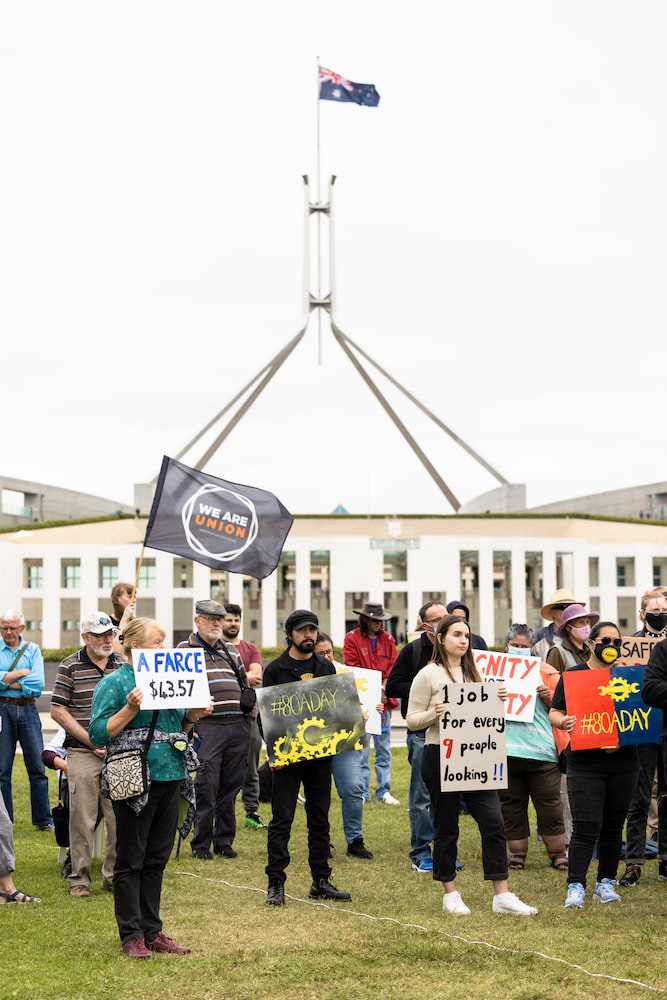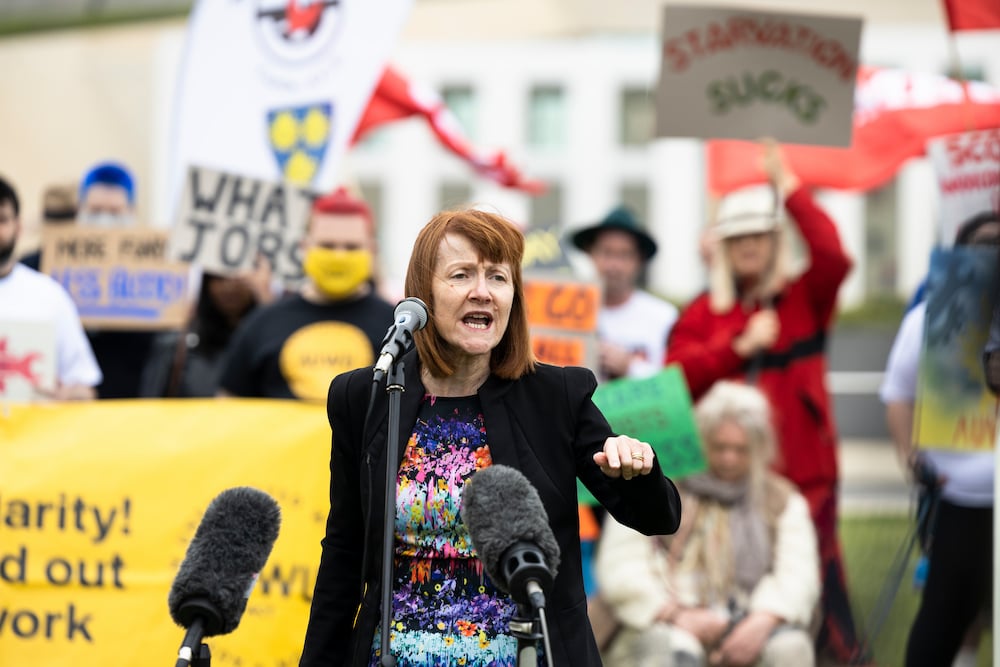ACT unemployed workers have joined forces with a national coalition of unions, councils and activists calling on the government to “break the poverty machine” by demanding income support payments are increased to $80 per day for unwaged, underemployed and insecure workers.
Protestors placed 1,400 empty chairs on the Parliament House lawn on Tuesday, 16 March, each representing 1,000 people who will be impacted when Centrelink payments are cut from 1 April.

Attendees heard from spokespeople how the end of the Coronavirus Supplement will negatively affect First Nations people, single mothers, people with disabilities, students, unemployed people and insecure workers.
Australian Unemployed Workers Union (AUWU) ACT member David Cribb was among the crowd, and told Canberra Daily he joined the independent, unfunded national volunteer organisation when the local branch was in its infancy in 2019.
“I was on Newstart and struggling on $40 a day,” he said. “I’ve lived on $80 a day with the Coronavirus Supplement and it’s such an enormous difference.”
Mr Cribb found the higher rate enabled him to pay for “obvious things” like healthy food, rent and clothes and it also gave him enough security to plan for the future.
“When you’re on something like $40 a day you’ve got no prospect to say, ‘OK, I might commit to doing this study’, or ‘I’ll try and look for this type of job’.
“There’s just no way to plan for your future if you really are struggling to get by week-to-week.”
National Council of Single Mothers and Their Children CEO Terese Edwards drew a link between low social security payments and gendered violence, citing evidence that 25% of women return to abusive situations due to financial insecurity.

“If your child is eight, that is about three or four years in primary school, you’re on JobSeeker,” she said.
“You’re unemployed and it doesn’t matter what sort of horrendous circumstances you’re in because there is no such thing as an exemption.
“So I’m the hard, truth telling reality check that this system is racist, it is sexist, and it’s underpinned by misogynist policy.”
There are currently 220,000 jobs in Australia for people looking for work, according to GetUp! Economic Fairness Campaigns Director Ed Miller.
“There’s a million unemployed people, and there’s 1.3 million underemployed people,” he said.
“It’s not good enough to those people to say that the best form of welfare is a job; those jobs do not exist, and you cannot bully them into it.”
Mr Miller presented Labor Senator Louise Pratt and Greens Senator Rachel Siewert with a petition containing 180,000 signatures in support of raising income support payments.
The Coronavirus Supplement began in April 2020 as an automatic additional payment from Centrelink of $550 per fortnight.
The supplement was incrementally reduced over the past six months, to $250 per fortnight in September, then to $150 per fortnight on 1 January 2021.
It is scheduled to cease entirely on 31 March.
In late February, Prime Minister Scott Morrison announced regular JobSeeker payments will rise by just over $3.50 a day, the largest permanent increase in the unemployment benefit since the mid-1980s.
In response to criticism that the increase of $50 a fortnight was too low, Treasurer Josh Frydenberg told reporters it was “a very substantial increase in the context of the JobSeeker payment”.
Mr Frydenberg did not indicate the government would consider an additional increase and there were “real improvements in the labour market”.

But the new JobSeeker rate did not alleviate concerns about the end of the Coronavirus Supplement, according to ACT AUWU’s Mr Cribb.
He said he saw a “big spike” in the number of new members to the free union when income support payments reduced from September, and another sizeable membership bump over the past few weeks.
“It’s obviously getting really urgent for people, that the payments are getting cut back.”
Mr Cribb said the time he spent living on the full Coronavirus Supplement was the most secure and healthy time in his life for the past four years.
“It really does just make a huge different to people’s lives.”
READ MORE:



